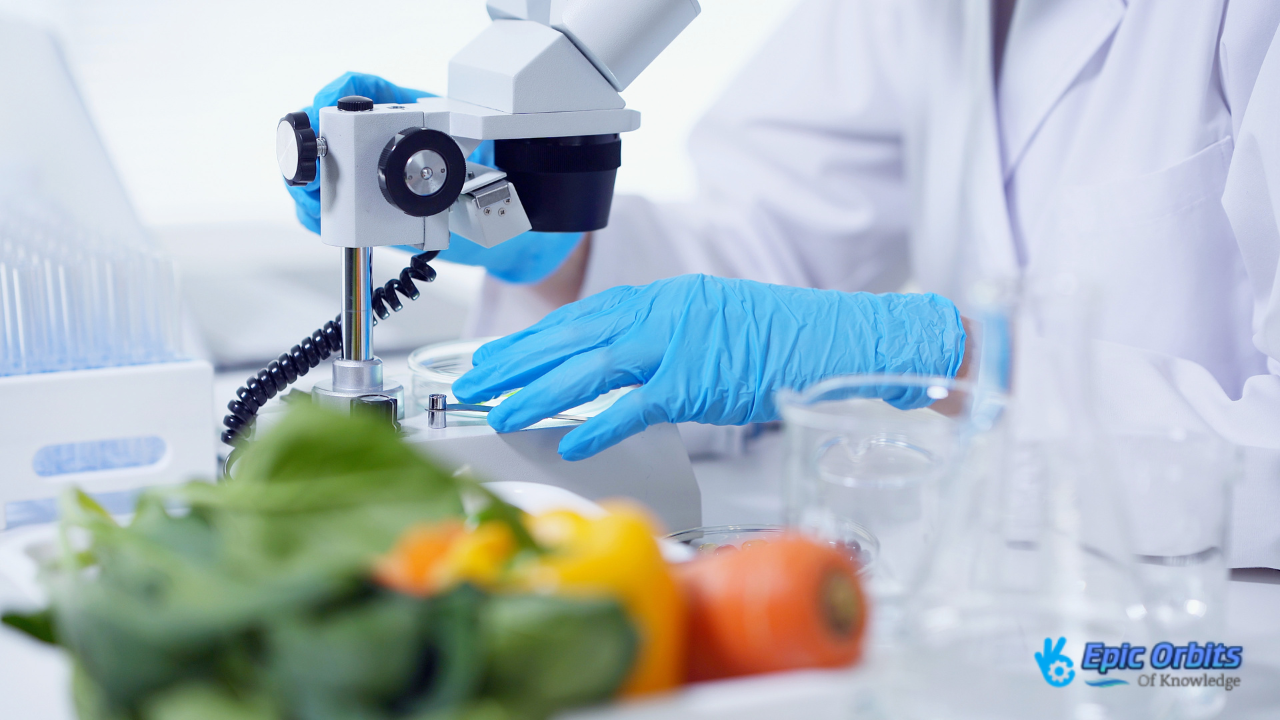Biotechnology Breakthroughs Transforming Our Future 2025
Biotechnology is a technology that uses biological systems or living organisms to develop or create different products.

Investigate biotechnology potential in 2025. Our how-to manual highlights revolutionary ideas meant to reshape our future.
We expect the worldwide biotech sector to expand from USD 483.0 billion in 2024 to USD 546.0 billion by 2025. Thanks to recently developed technologies such as single-cell analysis and genetic editing, this represents a 13.0% rise. From improved healthcare to more effective farming, these developments will fundamentally alter our lives in many respects.
A major component of this shift is gene-editing technology based on CRISPR-Cas9. This technology allows us to change genes with precision. This shift creates opportunities for new approaches to illness prevention and therapies.
Looking ahead, biotechnology will have an important bearing on the future of our planet. Biotechnology will enable us to create greener manufacturing processes, develop healthier crops, and identify new therapeutic approaches. Additionally, resulting from the combination of artificial intelligence, there will be major advances in customized medicine and medication development.
Technologies for single-cell analysis are finding a quickly expanding market. In 2023 it is USD 4.34 billion; from 2024 to 2030 it is anticipated to rise 18.7%.
Knowing Modern Biotechnology: An Instant Manual for the Foundations
Biotechnology is a rapidly expanding discipline combining biology with technology. It seeks improved human living and health. Thanks for developments in bioengineering and biotechnology applications; the biotechnology sector is exploding.
Synthetic biology, agriculture, environmental biotechnology, and industry are among the fields covered here. New goods and services result from these fields. Among the examples are biofuels, vaccinations, and biopharmaceuticals. Emphasizing products from sea life is also being used in aquatic contexts.
- Gene therapy involves modifying patients' cells to contain functioning genes that are intended to address hereditary disorders.
- Using natural or recombinant organisms, bioremediation cleans environmentally harmful contaminants.
- Customized medicine is the use of customized treatment procedures to treat certain individuals.
By 2025, the biotechnology sector is predicted to be worth around $727.1 billion. It will grow at a 7.4% CAGR in 2020. One must understand the foundations of current biotechnology as well as its many applications.
The DNA Revolution: How Gene Editing Changing Everything
Thanks to CRISPR-Cas9, genetic engineering has advanced significantly since 2012. Jennifer Doudna and Emmanuelle Charpentier discovered this technique. With almost three billion base pairs, the CRISPR-Cas9 system allows us to alter the human genome precisely.
By means of RNA-DNA interaction, the CRISPR-Cas9 system simplifies editing. This lets one aim for a wider spectrum.
Changing human features by means of gene editing begs major concerns. Still, gene therapy has been a goal since the 1980s. It seeks to correct genetic errors so as to either prevent or undo disorders. By 2025, the gene editing business is predicted to explode, surpassing $5 billion.
Several fields are benefiting greatly from genetic engineering:
- Genetic engineering aids in the treatment of hereditary conditions.
- Fresh approaches are being developed.
- Biotechnology research is making notable progress.
Genetic engineering will lead to additional discoveries as biotechnology studies progress. IThis technology can revolutionize many disciplines, including agriculture and medicine. Early clinical studies that utilize CRISPR-Cas9 have demonstrated considerable potential. It could help to drastically reduce the incidence of single-gene diseases.
Smart Medicine: Biotechnology-Based Personalized Healthcare
Personalized care is transforming medicine by utilizing biotechnology. Finding novel therapies relies heavily on artificial intelligence. Examining a large amount of data helps create customized treatment strategies specifically tailored for you.
About 60 percent of medical problems originate from lifestyle, financial situations, and more. Much of the importance rests on genetics. This phenomenon This statement explains why treating patients requires considering multiple factors. Businesses are utilizing artificial intelligence to create medicines specifically designed to enhance your genetic makeup.
Artificial intelligence serves purposes beyond just discovering novel medications. It also facilitates the prediction of therapy's effectiveness. It can even locate new patient groups suffering from ailments. As a result, such data leads to better therapies and improved health for individuals. Businesses like the All of Us initiative and the UK Biobank are making significant progress in their respective fields.
They are compiling a ton of information on genes and health. These initiatives will enable the development of therapies that are truly effective for individuals. Biotechnology will lead to significant changes in healthcare in the near future.
Agricultural Biotechnology Innovations: Green Revolution 2.0
AAnother global agricultural revolution is about to begin. Aiming to reduce environmental harm and boost food output, this Green Revolution 2.0 This initial This initiative also aims to make meals more nourishing. Key The advances in biotechnology, such as genetically modified organisms and gene editing, contribute to this change.
Biotechnology has many benefits in agriculture. This technology improves farming efficiency and reduces chemical use. GM technology has, for instance, cut pesticide use by 37% and raised agricultural yields by 22%.
Moreover, biotech crops grow 10–20% faster than non-biotech ones. This is especially true in areas heavy with insects.
Agricultural biotechnology is expanding rapidly. Every year, around 17 million farmers all around utilize genetically modified seeds. Experts predict that the agricultural biotechnology sector will reach a valuation of $70 billion by 2025.
The planet's rising population needs effective, environmentally friendly farming. Meeting this requirement calls for biotech advances.
The Industrial Effect of Applications of Biotechnology
Like manufacturing, the biotechnology sector is transforming many other industries. It makes use of other biotech techniques, including genetic engineering. Less environmental damage and sustainable expansion follow from this.
Many applications of biotechnology include creating microbes and enzymes. Biotechnology produces a wide range of products, from textiles to biofuels and detergents. For instance, without fossil fuels, Genomica's microbes can convert plant sugars into caprolactam, a main component in nylon.
Biotechnology makes manufacturing more environmentally friendly. Biotechnology reduces environmental harm in industries such as chemicals and materials. Businesses like EnginZyme have made significant changes, decreasing energy usage and prices.
Biotechnology is also leading to the development of new materials and products, such as bioplastics and biofuels. Industrial biotechnology and bio-based chemicals are finding a quickly expanding market. Experts predict a rise of 15 to 25% annually.
| Market Segment | Value (2022) | Growth Rate |
|---|---|---|
| Industrial Biotechnology | $125 billion | 15-25% |
| Bio-Based Chemicals | $1.5 billion | 15-25% |
Many fields will see significant changes thanks in large part to biotechnology. It will decrease environmental damage and enable sustainable development. There will be a growing number of new applications of biotechnology in various industries and other sectors.
Lab to Market: Commercializing Biotech Innovations
Biotech's trip from lab to market is challenging. Many of the biotechnology research-based inventions never find their way into the market. Predictions indicate that the biotech sector will rise at 7.4% yearly and reach $2.4 trillion by 2025.
Finding sufficient money is a major challenge. Of biotech firms, over 60% find it difficult to get capital. High expenses and legal obstacles prevent around 75% of biotech ideas from being successfully developed. However, companies may still thrive if they have the right research and development.
Some salient features of biotech commercialization are:
- A biotech product moves from lab to market over ten to fifteen years.
- About half of biotech firms began with government funds.
- To increase their market share, most effective biotech businesses form alliances.
Ultimately, biotech research and developments have the potential to revolutionize numerous sectors. Making these discoveries accessible, however, is challenging. Biotech firms may thrive with the correct assistance, financing, and alliances. This fuels industrial innovation and expansion.
Ethical Considerations and Legal Systems
News in biotechnology is always shifting, and businesses have to handle challenging ethical questions and regulations. For instance, people worry about safety and privacy issues related to genetic engineering. More regulations now exist to guarantee correct and safe use of biotechnology.
Important organizations that oversee biotechnology include the FDA, NIH, and USDA. They create guidelines meant to keep people safe. The FDA carefully reviews human gene editing, for instance. They consider safety, how it functions, and if it sets off immunological responses.
Furthermore, important for biotechnology is public acceptance. Still, ignorance about genetic engineering could cause uncertainty. Businesses must be honest and educate consumers to build trust and use biotechnology sensibly.
The main priorities of biotechnology firms should be to follow regulations and procedures, keep people safe and informed, teach and speak publicly to build trust, and collaborate with others to enhance biotechnology.
Prospective Investments in the Biotech Industry
The sector of biotechnology is explosive. From 2000, the overall income of the Nasdaq Biotechnology Index's biotech businesses has increased eleven times. Experts predict that the sector will continue to expand, with an annual rise of 10% over the next two years.
Investors are focusing on biotechnology. Gene-editing technologies, such as CRISPR, along with artificial intelligence applications in health and research, are attracting significant investments. In biotech, some major investment prospects include:
- With businesses like Homology Medicines obtaining $166 million in their IPO, gene editing technology is becoming more popular.
- In 2022, biotech start-ups will receive approximately $22 billion in venture capital financing, driven by artificial intelligence.
- We expect cell treatments to generate revenues of over $3 billion in 2022 and surpass $21 billion by 2026.
From well-known businesses to fresh start-ups, the biotech industry offers plenty of investment opportunities. The best option for people looking to diversify their portfolios is one that is predicated on rapid growth and possibly substantial returns.
Conclusion
Biotechnology is poised to make enormous scientific advances. Green manufacturing, tailored treatment, and gene editing are just beginning to emerge. These developments will resolve some of our toughest issues.
Top research institutions and the government of the United States are heavily funding biotechnology. They see its ability to address major concerns like illness and climate change. Targeted therapies and new artificial intelligence techniques will rapidly expand the area of biopharmaceuticals. Furthermore, biofuels and bio-based products are altering our way of life.
As we move forward, we have to consider the ethics and guidelines of biotechnology. Safety must always come first, even with fresh findings. Smart policies and cooperation will help the biotechnology age provide a better world for everybody.



